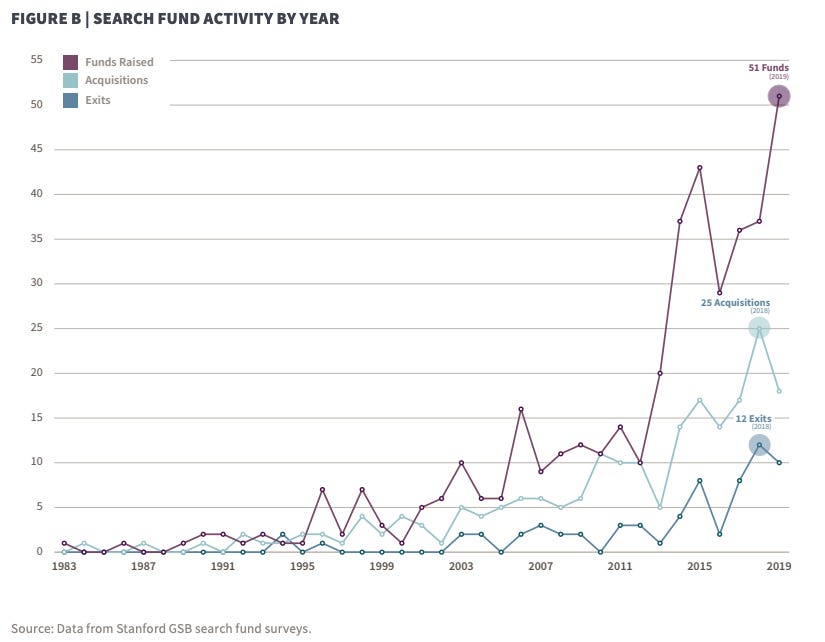A Niche Within Private Equity
Week of October 11th Lower Middle Market Highlights
Welcome to the weekend and thanks to the 65 new subscribers who joined since the last edition. We’re the only news source tracking lower middle market M&A. Our goal is to keep you up to date on the latest information/transactions in the market and highlight market participants that are doing interesting things in the space.
This Week’s Feature
This week we’re uncovering the world of search funds and search fund investing. This niche of investing has picked up steam over the last decade but owes its roots to the 1980s, when a professor at Stanford University’s Graduate School of Business, H. Irving Grousbeck, originated the concept. The idea is that through an investment vehicle, investors can financially support an entrepreneur’s efforts to locate, acquire, manage, and then grow a privately held company.
According to this 2020 Search Fund Study by Stanford’s Graduate School of Business, search funds are launching at record volumes. From 1984-2019, 401 search funds were formed in the U.S. and Canada, while 88 of them were launched between 2018-2019. Once upon a time, Harvard and Stanford were the only schools offering courses on search funds, but today that list has grown significantly.
Additionally, the 2020 study showed that during 2018-2019:
Average duration to complete an acquisition was 23 months
Median acquisition price was $10mm
Median EBITDA multiple paid was 6.0x
33% of searches ended without an acquisition
Independent Sponsors vs. Search Funds vs. Private Equity
There’s often some confusion as to the different private equity models. So what’s the difference between an independent sponsor, search fund, and traditional private equity?
One difference is that traditional private equity firms have raised a pool of committed capital in which they pull to acquire multiple companies. These firms have committed equity capital behind them and can invest in a company without outside approval from investors. Once a company is acquired, a private equity firm is involved in many aspects of the business but does not typically take control of day-to-day operations.
Independent sponsors and search funds act as fundless sponsors who raise funds on a deal-by-deal basis. Whereas an independent sponsor generally does not take on the day-to-day operations of a company, a search fund seeks to acquire a single business and then operate it. Additionally, a search fund raises capital from investors to fund the search process. In exchange, search fund investors receive the right, not obligation, to invest in the equity to finance the acquisition. These investors also receive the benefit of a stepped-up conversion of the search capital into the securities issued from the acquired company. This is a key difference between the two fundless sponsor types. Independent sponsors come in all ranges and sizes, some have incredible relationships with family offices and private equity and the ability to quickly close deals, while others do not. Conversely, a search fund has investors who have already committed search capital and thus have skin in the game. From a sell-side perspective, it can be more efficient for a search fund to close on a deal because of the investor pool that has already backed the searcher.
Search fund investors
The Stanford study cited above shows that $1.4b of equity capital has been invested in search funds since 1984. The aggregate pre-tax IRR for investors was 32.6% with a return on invested capital of 5.5x. It’s no wonder there has been a rush of firms to participate in these deals. We’ve compiled a list of active search fund investors below. Some firms listed solely focus on the search fund model, while others have layered on a search fund model into the firm’s overall private equity strategy:
Aspect Investors
Anacapa Partners
Search Fund Partners
Endurance Search Partners
Miramar Equity Partners
Alza Capital Partners
Pacific Lake Partners
Peterson Partners
Relay Investments
Granite Point Partners
WSC & Company
Futaleufu Partners
Bradford Brown Capital Partners
Ashford Venture Partners
The Cambria Group
Double R Partners
Graue Mill Partners
Housatonic Partners
M2O
ETA Equity
Maven Equity Partners
OPERAND GROUP
Liberty Search Ventures
Riviera Capital
Vonzeo Capital
Kinderhook Partners
Sage Capital Partners
Istria Capital
Hunter Search Capital
Greyhart Capital
Cerralv Capital
Cityfront Growth Partners
Mertal Family Partners
Saltoun Capital
Iron Creek Partners
Red Forest Capital
If interested in learning more, here are some additional resources that we have gathered:
2020 Stanford Business School search fund study Link
Searchfunder - the largest online search fund community Link
Search funds from the investor’s perspective Link
SearchFund.org Link
This Week’s LMM Activity
Search fund, Nova Vida, has acquired Ti Foods, a leading provider of Asian food products across Canada Link
Tide Rock Holdings acquires Pikes Peak Plastics Co. to grow plastics portfolio Link
Blackwell Capital acquires aerial equipment reseller, Stack Equipment Link
1847 Holdings acquires two companies to expand its cabinetry platform Link
Sunrise Treatment Center, a Bridges Fund Management portfolio co, acquires addiction treatment provider, Port 45 Recovery Link
Aries Capital launches new platform with the acquisition of Lyft’s Atlanta Driver Service Center Link
Longshore Capital Partners announces sale of Eclipse Advantage, a warehouse labor management company, to Two Sigma Link
Incline Equity Partners invests in residential cleaning services co, Perfect Power Wash Link
Andlauer Healthcare Group acquires Boyle Transportation, a transportation company to the life sciences industry Link
Fundraising
Balance Point Capital closes its sixth fund with $580mm in commitments Link
Genesis Park launches new $275 million fund Link
Other Stuff
Q3 US PE breakdown Link
Transforming how lower middle market healthcare firms are represented Link
Private equity funds, sensing profit in tumult, are propping up oil Link

